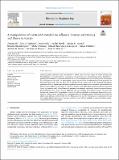Por favor, use este identificador para citar o enlazar a este item:
http://hdl.handle.net/10261/304804COMPARTIR / EXPORTAR:
 SHARE SHARE
 CORE
BASE CORE
BASE
|
|
| Visualizar otros formatos: MARC | Dublin Core | RDF | ORE | MODS | METS | DIDL | DATACITE | |

| Título: | A manipulation of carotenoid metabolism influence biomass partitioning and fitness in tomato |
Autor: | Mi, Jianing; Vallarino, Jose G; Petřík, Ivan; Novák, Ondřej; Correa, Sandra M; Chodasiewicz, Monika; Havaux, Michel; Rodriguez-Concepcion, Manuel CSIC ORCID ; Al-Babili, Salim; Fernie, Alisdair R; Skirycz, Aleksandra; Moreno, Juan C | Palabras clave: | Abiotic stress tolerance Apocarotenoids Biomass and yield Carotenoids Metabolic engineering Metabolites and lipids Phytohormones |
Fecha de publicación: | mar-2022 | Resumen: | Improving yield, nutritional value and tolerance to abiotic stress are major targets of current breeding and biotechnological approaches that aim at increasing crop production and ensuring food security. Metabolic engineering of carotenoids, the precursor of vitamin-A and plant hormones that regulate plant growth and response to adverse growth conditions, has been mainly focusing on provitamin A biofortification or the production of high-value carotenoids. Here, we show that the introduction of a single gene of the carotenoid biosynthetic pathway in different tomato cultivars induced profound metabolic alterations in carotenoid, apocarotenoid and phytohormones pathways. Alterations in isoprenoid- (abscisic acid, gibberellins, cytokinins) and non-isoprenoid (auxin and jasmonic acid) derived hormones together with enhanced xanthophyll content influenced biomass partitioning and abiotic stress tolerance (high light, salt, and drought), and it caused an up to 77% fruit yield increase and enhanced fruit's provitamin A content. In addition, metabolic and hormonal changes led to accumulation of key primary metabolites (e.g. osmoprotectants and antiaging agents) contributing with enhanced abiotic stress tolerance and fruit shelf life. Our findings pave the way for developing a new generation of crops that combine high productivity and increased nutritional value with the capability to cope with climate change-related environmental challenges. | URI: | http://hdl.handle.net/10261/304804 | DOI: | 10.1016/j.ymben.2022.01.004 | ISSN: | 1096-7176 |
| Aparece en las colecciones: | (IBMCP) Artículos |
Ficheros en este ítem:
| Fichero | Descripción | Tamaño | Formato | |
|---|---|---|---|---|
| 2-Mi MetabEng 2022.pdf | 3,98 MB | Adobe PDF |  Visualizar/Abrir |
CORE Recommender
PubMed Central
Citations
7
checked on 04-abr-2024
SCOPUSTM
Citations
17
checked on 19-abr-2024
WEB OF SCIENCETM
Citations
15
checked on 27-feb-2024
Page view(s)
38
checked on 23-abr-2024
Download(s)
58
checked on 23-abr-2024
Google ScholarTM
Check
Altmetric
Altmetric
Artículos relacionados:
NOTA: Los ítems de Digital.CSIC están protegidos por copyright, con todos los derechos reservados, a menos que se indique lo contrario.
